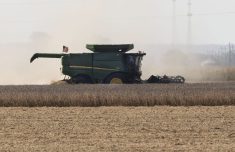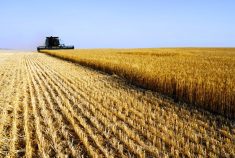GIBBONS, Alta. — Sweeping changes are coming to Alberta farms and ranches and their workers.
As of Jan. 1, workers compensation board coverage will be mandatory for all farms and ranches.
Farms and ranches will also be subject to Occupational Health and Safety legislation at the beginning of the year, said Lori Sigurdson, minister of Jobs, Skills, Training and Labour.
The bill called the Enhanced Protection for Farm and Ranch Workers Act was tabled in the Alberta legislature Nov. 17. It promises several changes to existing legislation that will affect how farmers and their workers do business.
Read Also

Alberta harvest wrapping up: report
Harvest operations advanced to 96 per cent complete in Alberta as of Oct. 7, with only a few late-seeded cereal and canola fields remaining, according to the latest provincial crop report.
“Providing farm and ranch workers these rights is simply the right thing to do,” said Sigurdson, from a Gibbons, Alta., grain farm.
“We know producers are taking a lot of right steps to ensure their workers are treated fairly on the job. The changes are the next steps,” she said.
* If the bill passes, it will be mandatory for all farms and ranches to have Workers Compensation Board coverage. Farmers will have until April 2016 to register, but workers will be covered from Jan. 1, 2016.
* Employment standards and labour relations changes would be implemented in the spring following consultations with farmers, ranchers and workers.
* Occupational Health and Safety technical rules will be developed in conjunction with industry and implemented in 2017.
* Labour relations changes allowing workers to bargain collectively will be effective in the spring of 2016.
Government officials are expected to work to ensure rules are practical, enforceable and make sense to industry. There is also potential for exemptions on employment standard legislation, said Sigurdson.
“We know harvest does not fit neatly into an eight-hour day and the calving season does not conform to a statutory holiday,” she said.
“If the bill passes, we can make rules that make sense for the industry.”
Farmer Michael Kalisvaart said he believes the changes are overdue.
“I am happy that we are going to see some legislated protection for farm workers. It is something I have supported for a long time. Safety and having some long-term benefits in case of accident for workers are important to us,” said Kalisvaart, who operates a 12,000 acre grain farm.
Two years ago, he voluntarily signed up for WCB to ensure benefits to his workers and his own farm.
“I don’t think this is anything to be afraid of and I think that agricultural businesses and farming community needs to make this an important part of their conversation.”
















